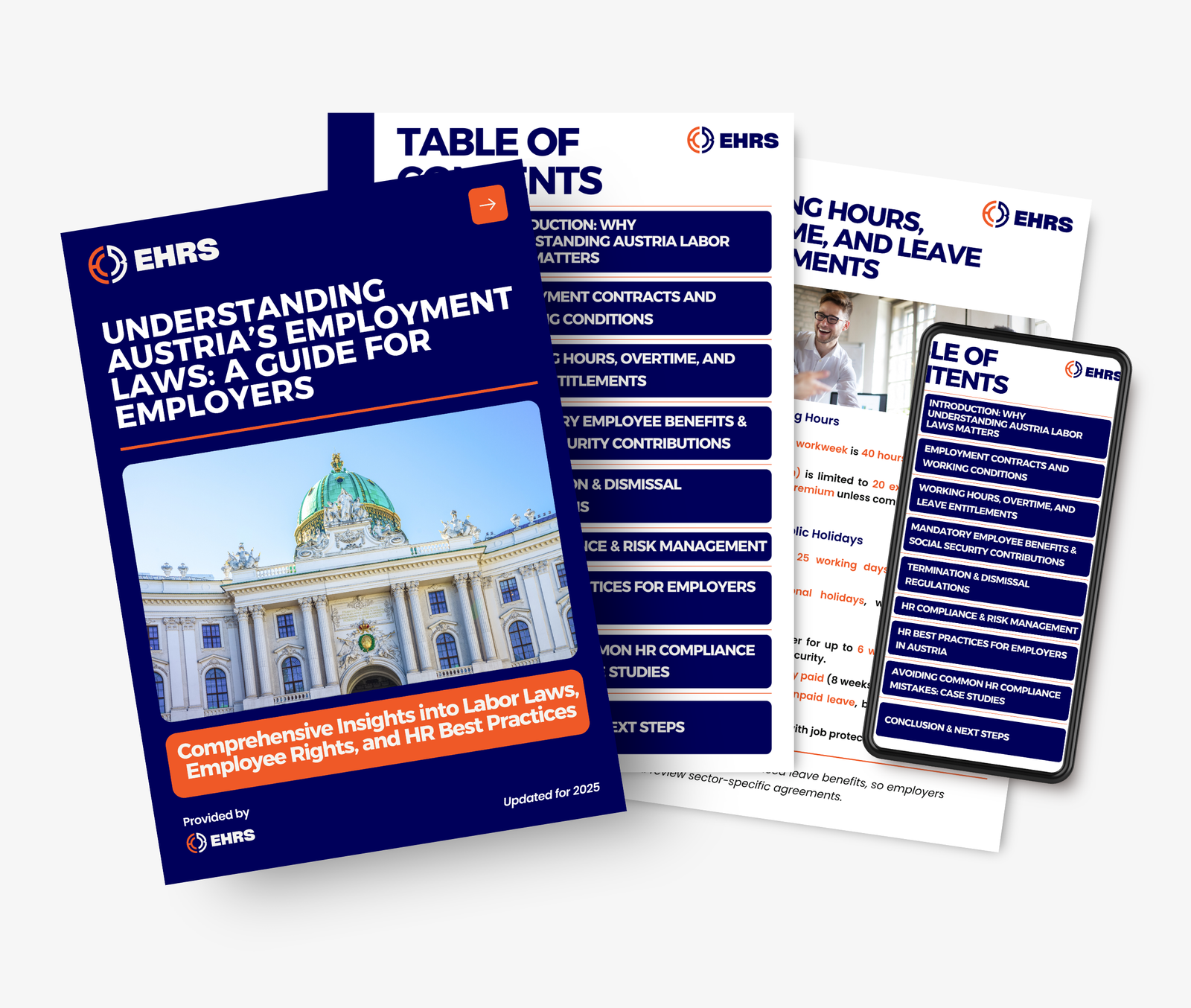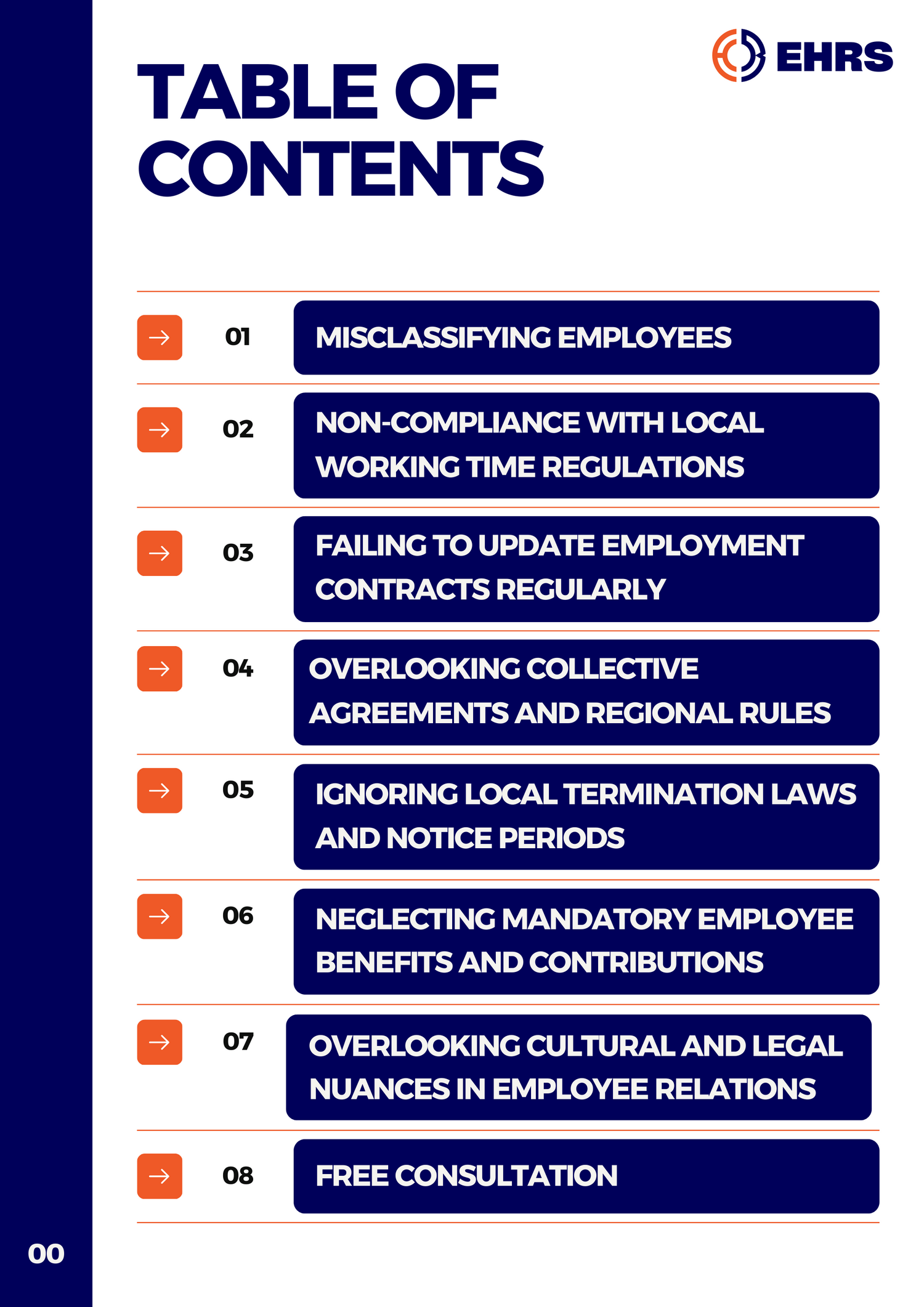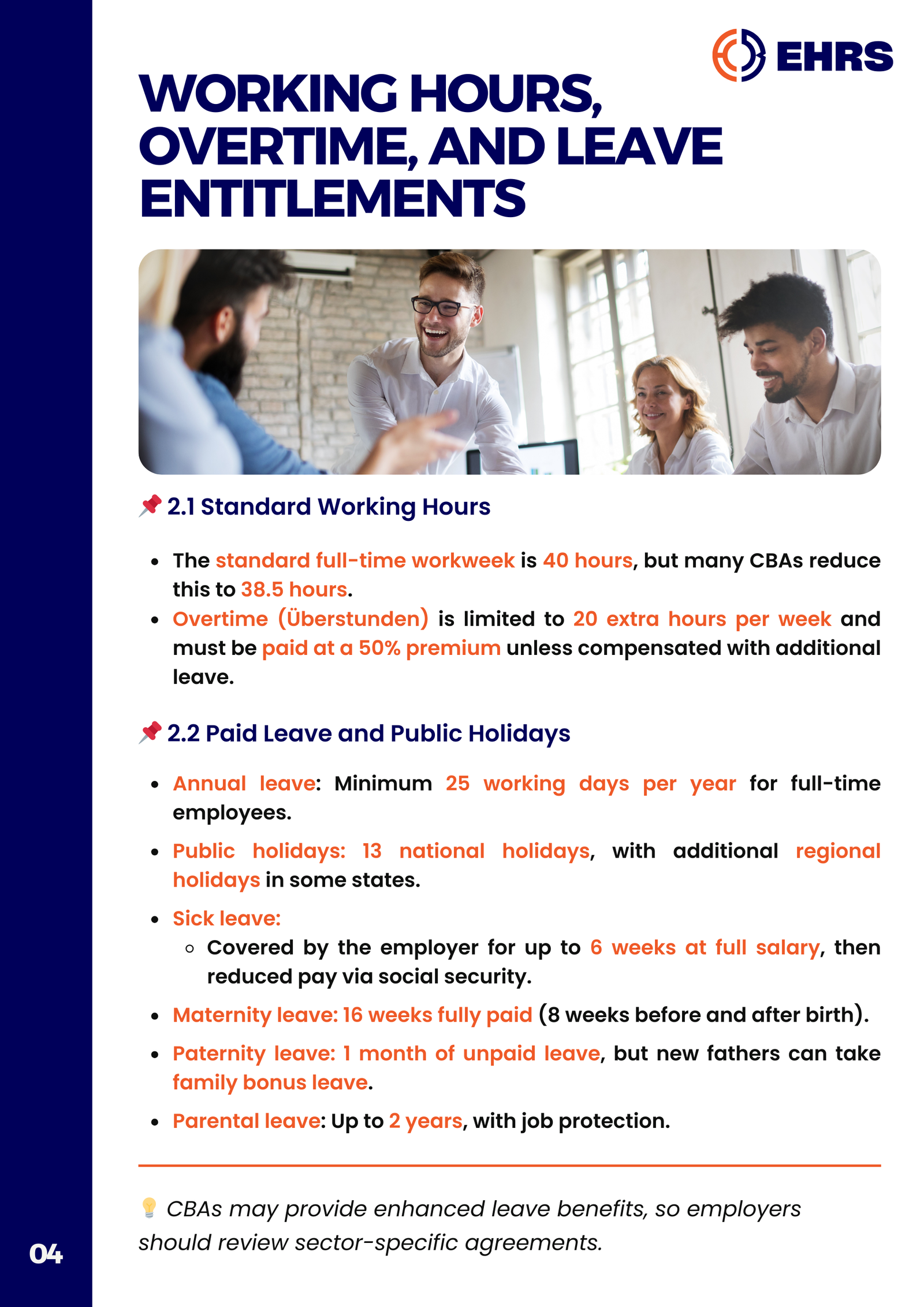AUSTRIA
List of countries
HR Services for Austria
Our company provides customized HR services in Austria to help international businesses expand smoothly and stay compliant with local regulations.
According to the US Department of State, Austria’s GDP consists of 50% exports, the US is a top two-way trading partner, and US companies support over 17,000 jobs in the European country. The country’s economy has bounced back from the COVID-19 pandemic and is linked to its European Union (EU) neighbors. Research & Development (R & D), advanced technology, and service in Austria are industries ripe for foreign investments and expansions.
Nuances of HR as you expand from the US or UK into Austria can make building an in-house HR department costly, time-consuming, and present endless challenges. However, HR outsourcing services can help you to cut through logistic and legal red tape. A professional outsourcing team can hit the ground running to ensure your foundational HR is in place.
ALL YOU NEED TO KNOW ABOUT
HR OUTSOURCING IN AUSTRIA
AUSTRIAN EMPLOYMENT
REGULATIONS TO KNOW
THE BENEFITS OF
EXPANSION IN AUSTRIA
THE CHALLENGES OF
EXPANSION IN AUSTRIA

Check our free HR guide to help you quickly improve your HR in Austria
FAQ for Austria
Learn more about Austria
Free Download
Request your free guide and receive it immediately

All You Need to Know About Outsourcing
Your HR in Austria With EHRS
Streamlined HR Processes
Outsourcing your HR with Europe HR Solutions ensures that your HR processes, from recruitment to payroll, are handled efficiently and in compliance with Austrian labor laws. Our comprehensive HR services package for Austria covers every aspect and allows you to focus on business growth while we manage the complexities of HR operations.
Legal Compliance Expertise
Austrian labor laws are strict and complex, covering areas such as employment contracts, working hours, and employee benefits. Europe HR Solutions provides expert guidance to ensure your business meets all legal requirements. With our expert HR services for Austria, you can navigate complex employment laws, tax compliance, and local labor regulations with great confidence.
Cost-Effective Solutions
By outsourcing HR, you eliminate the need to establish an in-house HR team, saving costs on salaries, benefits, and training. You also reduce the risk of non-compliance fines, ensuring cost efficiency in your operations.
Austrian Employment Regulations to Know
Employment Contracts
All employment relationships in Austria require a written contract that clearly outlines terms such as salary, working hours, and leave entitlements. Contracts must comply with Austrian labor laws and any applicable collective bargaining agreements (CBAs).
Working Hours & Overtime
The standard workweek in Austria is 40 hours, with any additional hours considered overtime. Overtime must be compensated, either through additional pay or time off, as per Austrian regulations.
Employee Benefits
Austrian law mandates benefits such as 13th and 14th-month salary payments, statutory leave, and access to social security programs, including healthcare and pensions. These must be integrated into your HR policies.
The Benefits of Expansion in Austria
Central European Location
Austria’s strategic location makes it an excellent gateway to European markets, offering access to both Western and Eastern Europe. Its well-connected transportation and logistics infrastructure supports seamless business operations.
Skilled Workforce
Austria boasts a highly educated and skilled workforce, particularly in industries such as technology, manufacturing, and engineering. This talent pool enables businesses to build strong, competent teams.
Stable Economy
Austria’s stable economy, strong legal framework, and supportive business environment make it a low-risk destination for business expansion.
The Challenges of Expansion in Austria
Complex Labor Laws
Austrian labor laws are highly detailed, requiring careful attention to employment contracts, working conditions, and collective agreements. Non-compliance can result in significant legal and financial penalties.
High Labor Costs
Austria’s labor costs are among the highest in Europe due to mandatory benefits and social security contributions. Businesses must budget effectively to remain competitive.
Language & Cultural Differences
While English is widely spoken in business, German is the official language in Austria. Understanding local cultural nuances is essential for fostering employee engagement and workplace harmony.
Talk to an HR specialist about payroll, compliance, and audits today.
Expand into Austria with confidence.
Most Asked Questions
About Austria
Why do I need a written employment contract in Austria? Aren’t verbal agreements valid?
While verbal agreements are legally binding, Austrian law strongly recommends written contracts to ensure clarity on salary, job duties, and working conditions. Without one, disputes can easily arise, leading to legal risks.
Why It’s Risk-Free: We draft clear, compliant contracts that protect your business and establish clear expectations for employees.
Do I really need to track working hours in Austria? Isn’t flexibility more practical?
Standard working hours in Austria are 8 hours per day and 40 hours per week, with exceptions for specific industries. Employers are required to document hours worked to comply with labor laws.
Why It’s Risk-Free: We implement systems to track working hours, ensuring compliance while accommodating flexible work arrangements
How much annual leave do I need to provide? Isn’t the statutory minimum enough?
Employees in Austria are entitled to 25 working days of paid annual leave, increasing with tenure. Offering only the statutory minimum might suffice legally but could harm retention.
Why It’s Risk-Free: We help design competitive leave policies that comply with regulations and align with market expectations.
Parental leave in Austria seems long. How can I maintain productivity with employees on leave?
Parental leave can last up to 2 years per parent. Employers are not required to pay salaries during this period, and careful workforce planning can mitigate disruptions.
Why It’s Risk-Free: We assist with leave planning and compliance, helping you manage absences while supporting employee well-being.
Are collective agreements (CAs) mandatory in Austria? Can’t I just create my own policies?
CAs are industry-specific and automatically apply if your business falls under one. They govern wages, benefits, and working conditions. Ignoring CAs can lead to disputes.
Why It’s Risk-Free: We identify applicable CAs and ensure your policies align, keeping you compliant and avoiding conflicts.
How do payroll taxes work in Austria? What happens if I make a mistake?
Employers must deduct income tax, social security, and health insurance contributions. Errors can lead to fines or audits by Austrian authorities.
Why It’s Risk-Free: We manage payroll compliance, ensuring accurate deductions and timely filings to avoid penalties.
Do I need to focus on health and safety in Austria? Isn’t that just standard practice?
Employers are legally required to ensure a safe workplace, including conducting risk assessments and providing safety training. Non-compliance can lead to penalties or liability.
Why It’s Risk-Free: We conduct risk assessments and develop safety policies, ensuring compliance and protecting employees.
Is compliance really worth the cost? Won’t it just increase my overheads?
The cost of non-compliance—fines, lawsuits, and employee turnover—far exceeds the investment in getting it right. Compliance also builds trust and operational stability.
Why It’s Risk-Free: We streamline compliance processes, saving you time and money while ensuring your business operates smoothly and legally.
Are probation periods necessary? Can’t I just terminate employees who aren’t a good fit?
Probation periods in Austria, limited to 1 month, allow for termination without notice during this trial phase. Without one, dismissals are subject to stricter labor laws.
Why It’s Risk-Free: We structure probation periods to align with Austrian regulations, giving you flexibility while reducing legal risks.
Is overtime pay mandatory? Can’t I just offer extra leave instead?
Overtime must be compensated with a 50% premium or additional time off, as outlined by Austrian labor law or collective agreements. Failing to comply can lead to disputes.
Why It’s Risk-Free: We ensure your overtime policies are clear, compliant, and fair, protecting you from wage claims or penalties.
Do I need to pay employees during sick leave? Isn’t this covered by social insurance?
Employers must pay full salary for sick leave, typically up to 6 weeks, depending on the employee’s tenure. After this period, sickness benefits are managed by social insurance.
Why It’s Risk-Free: We manage sick leave documentation and compliance, ensuring accurate payments and smooth transitions to state coverage.
Termination laws in Austria sound restrictive. What if I need to reduce staff quickly?
Terminations must comply with Austria’s Labor Code, which includes notice periods and protections against unfair dismissal. Non-compliance can result in legal claims.
Why It’s Risk-Free: We guide you through compliant termination processes, minimizing risks and protecting your business from costly disputes.
Are pensions mandatory in Austria? Isn’t salary enough to retain employees?
Employers must contribute to the statutory pension system through social insurance. Offering additional pension benefits can enhance your employer brand and improve retention.
Why It’s Risk-Free: We ensure all pension contributions are compliant and help design attractive packages to support employee loyalty.
Can I hire non-EU workers in Austria? Isn’t the process too complicated?
Non-EU workers require a Red-White-Red Card, which involves proving compliance with salary and skill requirements. Delays or errors can impact hiring timelines.
Why It’s Risk-Free: We handle the permit process, ensuring compliance and smooth onboarding for international hires.
What happens if I fail a compliance audit in Austria? Could it disrupt my business?
Non-compliance with Austrian labor laws can result in fines, legal claims, or reputational damage. Inspections may focus on contracts, payroll, and workplace safety.
Why It’s Risk-Free: We proactively review your policies and practices, ensuring you’re fully compliant and prepared for inspections.



